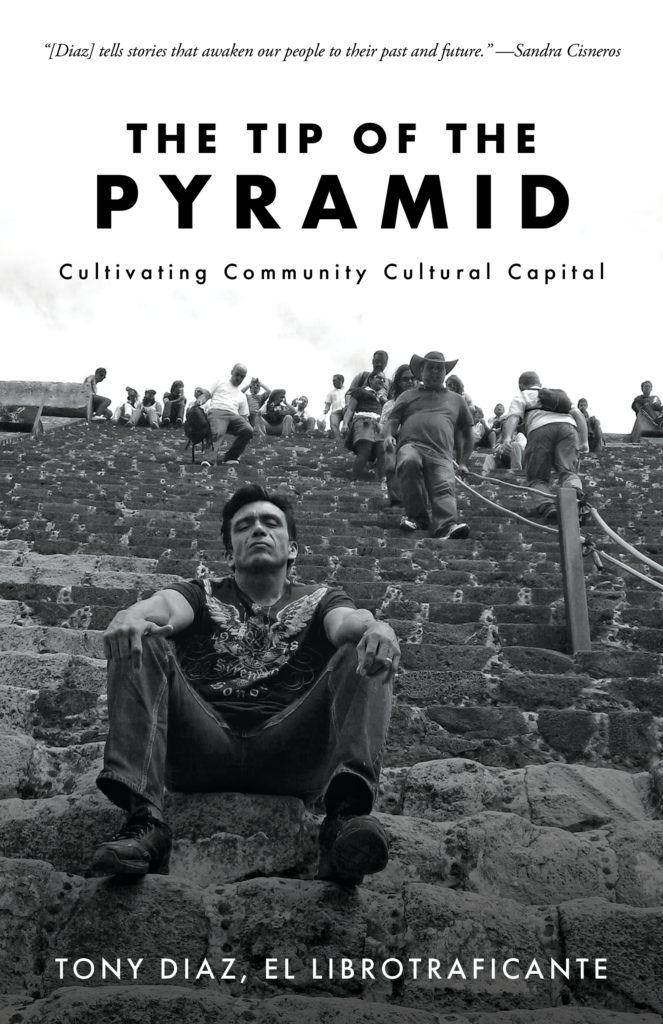[ad_1]
Tony Diaz, a Houston-based writer, activist, talk show host, and self-described “cultural accelerator,” goes by many monikers. He was Antonio Diaz as a schoolboy on the South Side of Chicago. He became the AztecMuse as a writer in Houston, where he was the first Chicano to get an MFA in creative writing from the University of Houston. A stylish artist known to pace, and rattle off jokes with the speed of a practiced emcee, he’s also known as “El Librotraficante” for his role in a movement led by an intrepid band of Houstonians to fight Arizona’s ban on Mexican American studies a decade ago.
The so-called librotraficantes—which included current Texas poet laureate Lupe Mendez, and Houston environmental justice activist Bryan Parras—rode in a caravan to Arizona, smuggled in books, and established underground libraries. Ultimately, they assisted in a successful court fight that overturned Arizona’s ban. Among the books that had been targeted was native Texan Sandra Cisneros’ classic novel, The House on Mango Street. Diaz has continued to build networks of Chicano writers, artists, allies, and “cultural accelerators” ever since.

Diaz—who also leads the nonprofit writers organization Nuestra Palabra: Latino Writers Having Their Say—has now authored a nonfiction book commemorating the 10th anniversary of the Librotraficantes’ caravan, called The Tip of the Pyramid: Cultivating Community Cultural Capital. The book launched at the Latino Bookstore in San Antonio and festivities will continue October 3 at Houston’s Alley Theatre with an event that will reunite Diaz with Nuestra Palabra veterans and feature dance performances too.
His book is a call to action. He’s looking for more cultural accelerators to rise up, band together, and take action against a new wave of book bans and other challenges: “We must mark Our victories. We must acknowledge that, with Librotraficantes, We reached The Tip of The Pyramid and will again. We must look at the risks, the costs, the beauty of it. We must study the tactics,” he writes in the book’s atypical “PROS” (prose) style.
In this interview, which has been edited for length and clarity, the Texas Observer spoke with Diaz about the book, his life, and his dreams.
You talk a lot in your book about “cultural accelerators”—what do you mean?
My first job as a kid was to learn English as quickly and as well as possible to translate the outside world into Spanish for my parents. And it soon dawned on me that even adults were not exactly sure what they were saying in either language.
By the same token, we do need a common ground. So in the book’s preface, one way to describe the metaphor “cultural accelerator” is folks from our community who’ve achieved self-determination and are advancing in their chosen fields or who stay in touch with the community, and then in an act of self-determination, some of us say, well, we’re Chicano.
I mention it in the preface, and then I dramatize it in the rest of the book because I think society either ignores folks like us or, you know, we don’t understand the power that our community can have when we unite.
Today in Texas, you and other Chicanos, Mexican Americans, and Latinx writers play leadership roles in the arts. For example, Lupe Mendez, your fellow librotraficante from Houston, is Texas Poet Laureate. Both the current and past presidents of Texas Institute of Letters are Mexican American. Are you celebrating?
I think those are huge milestones. At a community level, we are thriving. The complication becomes that what’s given more importance in corporate media, corporate education, corporate entertainment, are these generalizations about our community. The executives in charge of corporate entertainment, they’re illiterate about Latinos.
At a community level, I make it a point that we’re not just powerful, we’ve proven that power by uniting to overturn the ban of Mexican American studies in Arizona, because that was clearly created to destabilize our community’s cultural capital. And here in Texas, you know Librotraficantes came back and we reignited the ethnic studies movement. And together we were able to get, you know, Mexican American history endorsed at the state level. Those are two examples of what I call the “tip of the pyramid.” They are powerful examples of our community’s power.
[pull]They think that our communities will say, “Well, that’s not us, that’s the other community.” They don’t understand the plurality of the community.[/pull]
What are some of the challenges you still see in the current round of book bans?
What’s happened is that “the right” is not going to ban Mexican American studies again. However, when I look over the list, there’s many books by and about Latinos on that list. The Texas State Representative [Matt Krause] put Gloria Velásquez’s Tommy Stands Alone on that list. She’s Chicana, and then she wrote about the LGBTQ experience. Benjamin Alire Saenz is from Texas. He’s Latino. His books are on that list. Rigoberto Gonzalez, “Mariposa Boy” [author of Butterfly Boy: Memories of a Chicano Mariposa], that’s on that list.
So what happened then is that the attempts to censor us have been updated, and they’re trying to play off the fact that they think that our communities will say, “Well, that’s not us, that’s the other community.” They don’t understand the plurality of the community.
Your talk show airs on the lefty KPFT radio station—and you also are a political commentator on the local FOX news affiliate in Houston. How do you pull that off?
One thing I say in the book is that we have to co-opt everything!
I was shocked too when FOX 26 was asking me if I wanted to be on their political talk show. And I warned them, I’m like, “I’m going to give those right wingers a complex,” and they said, “Well, bring it.” So also, I wanted a chance to respond to folks that were trying to propagate stereotypes about our community. I’ll also add that being at both KPFT and FOX, as well as social media, that also helps spread the word about our different campaigns. We’re fighting for ethnic studies here in Texas and it was very helpful to be on both of those mediums.
I know you’ve been working on the boards of many different organizations in Houston—not just with people in your wheelhouse, writers and storytellers, but with many other kinds of artists and thought leaders. Why?
That’s the goal of my book, is to reveal “cultural accelerators” and get us to unite right now, because not only is there this opening, but there is this onslaught. There are folks that want to destabilize our communities. And I also believe that the country needs us. I mean, the country really needs every level of society to be engaged.
[ad_2]
Source link
Related posts
Today's pick
Recent Posts
- The Road Less Paved: An Introduction to Gravel Biking – Steven Rindner
- DIY Moving vs. Professional Movers: Navigating the Best Path for Your Relocation – Safe Ship Moving Services
- The Debt Ceiling and Technological Innovation: Navigating Future Frontiers – Kavan Choksi
- The Federal Reserve: Navigating Business Impacts – Kavan Choksi
- Embracing Community: The Ascendance of Multifamily Living – Kanat Sultanbekov
Archives
Categories
| M | T | W | T | F | S | S |
|---|---|---|---|---|---|---|
| 1 | 2 | 3 | 4 | 5 | ||
| 6 | 7 | 8 | 9 | 10 | 11 | 12 |
| 13 | 14 | 15 | 16 | 17 | 18 | 19 |
| 20 | 21 | 22 | 23 | 24 | 25 | 26 |
| 27 | 28 | 29 | 30 | 31 | ||

